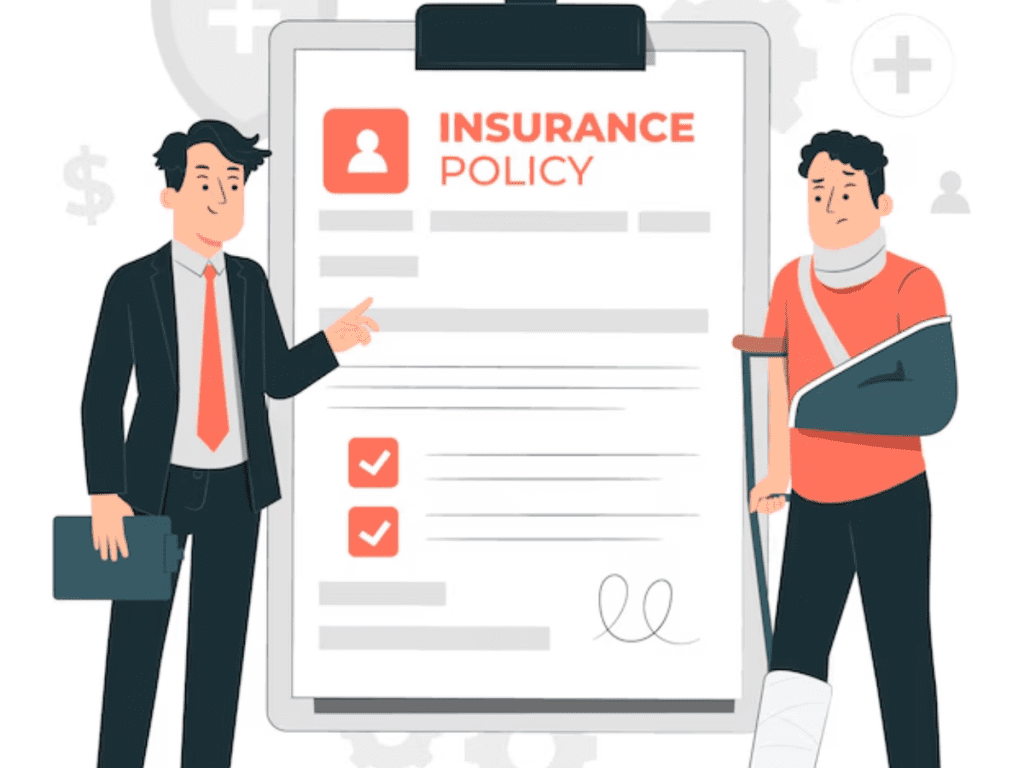Introduction
Most people talk about financial planning and think of investments, savings, retirement accounts, and health insurance. What usually doesn’t get any attention is the disability insurance that should be considered to keep them from going broke if a serious illness or accident befalls them. Knowing what disability insurance is and why it is an important part of financial planning can help you make informed decisions about protecting your future.
What Is Disability Insurance?
Disability insurance is a particular type of insurance policy that is meant to replace a portion of your income during times when you cannot work because of an illness or injury that disables. Health insurance covers the medical costs, while disability insurance guarantees that you have an ongoing source of income to continue supporting yourself, whether or not you can earn a paycheque.
There are two primary types of disability insurance:
- Short-Term Disability Insurance: This type of insurance covers temporary disabilities and lasts anywhere from a few months to a year, depending on the terms of the policy. It is useful for short-term disabilities such as post-surgery recovery, minor injuries, or short-term illnesses.
- Long-Term Disability Insurance: It will be activated in case of disability, which does not allow you to work for a long period of time, say years or until retirement age. Long-term disability insurance is highly recommended for those with a high earning capacity or who have an income that would support their family.
Why Do You Need Disability Insurance?
Disability insurance is a significant component of financial planning for several reasons:
1. Income Protection
Your ability to earn an income is one of your most valuable assets. A disabling illness or injury can jeopardize your ability to work, and without a steady income, it becomes challenging to meet basic living expenses such as rent, mortgage payments, utility bills, and groceries. Disability insurance acts as a financial safety net, ensuring that your income is protected even when you cannot work.
2.Covers Everyday Expenses
Loss of income due to disability causes huge financial problems. Disability insurance equips you with the financial muscle to pay all your daily running costs, hospital bills, and all other financial liabilities while you heal. This minimizes the chances of getting behind in payments, falling into debt, or running through savings.
3. Protects Long-Term Financial Goals
Without disability insurance, you would be forced to dig into your retirement funds, selling off investments at an opportune time to survive in case of a disability. This would jeopardize your long-term financial objectives and goals, such as buying a house, your children’s college funds, or a post-workable retirement. Disability insurance keeps your plans intact and ensures that you’re on track for a secure future ahead.
4. Reduces Dependence on Others
Without disability insurance, you will be dependent on your family members, friends, or the government to sustain you through difficult times. This will place a huge emotional and financial burden on your loved ones. Disability insurance allows you to remain independent and not a financial burden on those around you.
5. Fills Gaps Left by Employer Benefits
Although some employers offer disability insurance as part of the benefits package, such policies are often limited in scope. For example, they may only pay a portion of your income or cover you for only a limited period. Supplemental disability insurance will guarantee that you are fully covered with a policy designed according to your needs.
Common Misconceptions About Disability Insurance
Its significance, however is undervalued for most people as many believe disability insurance is quite unnecessary. Among these are:
- “I Am Healthy and Never Needed It.”
Surely, accidents are only associated with other individuals. However, what can be seen about adults is that one in every four will get disabled before age time to retire. It is therefore true that there can be conditions from diseases of cancer, heart conditions, among other chronic problems instead of injuries. - “I Have Enough Savings to Cover Me.”
Savings can easily be depleted by living expenses and medical bills. Disability insurance will provide a steady income stream, so you don’t exhaust your savings. - “Workers’ Compensation Will Cover Me.”
Workers’ compensation only applies to work-related injuries or illnesses, which is a small percentage of disabilities. Disability insurance covers the disability regardless of where or how it occurs. - “It’s Too Expensive.
While disability insurance is expensive, it is often less expensive than most people think. The cost of paying for a policy is much less than the financial cost of losing your income for months or years.
How to Choose the Right Disability Insurance Policy
Choosing the right disability insurance policy requires careful consideration of your needs, lifestyle, and financial situation. Here are some key factors to evaluate:
- Benefit Amount: Look for a policy that provides a sufficient percentage of your income to cover your essential expenses, typically around 60-70% of your pre-tax earnings.
- Elimination Period: This is the waiting period between the onset of your disability and when benefits begin. Shorter elimination periods provide quicker payouts but may come with higher premiums.
- Benefit Period: Determine how long you’ll need coverage—short-term, long-term, or until retirement age.
- Policy Definitions: Ensure the policy defines “disability” in a way that aligns with your needs. For instance, “own-occupation” policies cover you if you’re unable to perform the duties of your specific job, while “any-occupation” policies only cover you if you cannot work in any capacity.
- Cost of Premium: Compare quotes among various insurance providers to get an affordable policy which provides all round coverage.
The Long Term Advantages of Disability Insurance
The disability insurance plan is not merely a short term solution for unforeseen health problems; there are several long term benefits to this coverage which eventually add to the overall financial wellbeing. Let us now look in detail how the coverage will favor your life for more than the replacement of income loss.
1. Protection of Your Lifestyle
Earning an income is directly linked to your standard of living. When you are unable to work and do not have sufficient financial provision, you are likely to suffer drastic lifestyle alterations, such as selling your house, downsizing, or having to curtail necessary expenses. Disability insurance lets you maintain your lifestyle by enabling you to fulfill your financial commitments even if you cannot work.
2. Support for Families
If you’re the primary earner in your household, your income is critical to your family’s financial stability. Disability insurance provides peace of mind that your loved ones will continue to have the resources they need, such as housing, education, and healthcare, even during a period of disability. This ensures that your family’s quality of life remains unaffected.
3. Mental and Emotional Peace
Financial pressures can really weigh down your mental and emotional state. The fact that you know you have a cushion there to fall back on with disability insurance helps alleviate fears and lets you focus on getting better. This feeling of security is priceless at a time when your mind needs to be elsewhere: on your health.
4. Bridge to Retirement
A long-term disability can interrupt planning for the ability to create, or even build upon, an existing retirement nest egg when someone enters retirement. In this sense, disability insurance forms a bridge spanning the time of disability to reach retirement, on which retirement will be supplemented by sources, such as pension, 401(k), and Social Security funds.
5. Tailored Solutions with Coverage Options
Disability insurance policies are very flexible, so you can customize coverage to fit your needs. You can add options such as cost-of-living adjustments, additional coverage riders, or partial disability benefits, which will provide you with financial support even if you can only work part-time because of your condition.
Real-Life Scenarios: Why Disability Insurance Matters
It’s easy to think of disability insurance in abstract terms, but real-life examples can illustrate its importance:
- The Self-Employed Professional: Imagine a freelance graphic designer who suffers a severe wrist injury, making it impossible to work. Without disability insurance, they lose their sole source of income, putting their financial stability at risk. A disability insurance policy ensures they can continue paying their bills and recovering without worrying about their livelihood.
- Young and Healthy Worker: A 30-year-old software engineer may think they are invincible, but a sudden illness such as cancer can render them unable to work for months. Disability insurance protects their income and means they won’t slide into debt during treatment and recovery.
- The Family Breadwinner: A parent with two children suffers a debilitating accident. Without disability insurance, the family cannot make ends meet. With coverage, the family’s needs are met, and the parent can focus on rehabilitation.
How Disability Insurance Complements Other Financial Tools
Disability insurance complements other elements of your financial plan to provide comprehensive protection. Here’s how it fits into the bigger picture:
- Emergency Savings: An emergency fund may cover some short-term expenses, but it is not built to replace several months or years of lost income. Disability insurance then steps in when funds are depleted and ensures long-term financial security.
- Health Insurance: Health insurance pays for healthcare, but does not replace income. Disability insurance steps in to help bridge the gap of lost income while you can cover your daily needs and your health expenses.
- Life Insurance: In essence, life insurance insures your family against your death and disability insurance insures your income against disability when you are alive but unable to work. This means that both policies will provide solid support to your financial bottom line.
- Retirement Savings: Disability insurance bars you from withdrawing portions of your retirement savings, thus protecting your future finances.
Probably, the most common mistake is to wait too long to obtain disability insurance. Ideally, it should be bought when one is young and healthy; in this way, the premium rates are lower, and the flexibility in coverage options is higher. In most cases, waiting until one develops a health condition or experiences a disability may make it hard or even impossible to qualify for coverage.
Disability insurance is more than an optional financial product; it is a core component of any comprehensive financial plan. It helps protect your income, supports your family, and preserves your financial goals, giving you the confidence and resilience to face life’s uncertainties. Investing in disability insurance today is an investment in your future stability and peace of mind.

